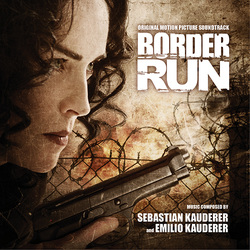
Scoring the film are Argentine father/son duo Emilio and Sebastian Kauderer. The elder of this team, Emilio Kauderer, is best known for his score for Juan José Campanella's Oscar-winning thriller El secreto de sus ojos (The Secret in Their Eyes), which he co-composed with Federico Jusid. His music is actually something of a national institution in Argentina, having graced events from the opening of the Winter Olympics to the closing of the bicentennial celebration of Argentina's independence. The composer has won a number of Argentine cinema awards for his scores and, along the way, has frequently collaborated with his son Sebastian, a 2007 graduate of Boston's Berklee College of Music.
Together, the co-composing duo creates a broodingly textural score for Tagliavini's film. What it does right is establish a tangible sense of place, the use of guitars and various Latin instruments evoking a stark Mexican setting. The harshness of the environment and grit of the people seem priorities for Emilio and Sebastian Kauderer, and they certainly keep a tone throughout that reflects this. You can really feel the darkness that Talbert is plunging herself into, and imagine the horrors she is uncovering. Unfortunately, this attention to dark, brooding soundscapes also hinders the score. If there are themes, they are vague and murky, buried amidst some very grating textures and rhythms. Mind you, I make it a point to not have a problem with a composer if he or she decides to take an athematic approach. It's a composer and director's prerogative, and it often works wonders in the context of the film. But it's also a trade-off, giving a listener very little to latch onto.
The quality of Border Run is consistent throughout. Each idea, however vague, is executed with true precision and artistry. "Opening" is a relentlessly driving piece, while "On the Road" and "Graves" feature effectively melancholic acoustic guitar solos. The two most satisfying pieces come in the form of "Sophie", which builds a tragic string ensemble over strumming acoustics, and "Crossing the Border", a determined finale piece. The latter of these cues easily stands out as the score's strongest asset, where the Kauderers merge the guitars and string ensemble for added emotional resonance. There are some worthy moments too in "To the Altar" and "Belly", a pair of cues that utilize vague chord progressions to solemn effect. Then there are pieces like "Torture and Escape", "Bag Steel", "Entering the Truck", "Last Seeing", "Drugs", and "The Real Mule", which all explore relatively similar ambient soundscapes. It's these kinds of cues that make the score a more challenging listen, as they signify roughly fifteen minutes of grating, scraping, grumbling, and deep whirring of the bass region. It's shapeless ambiance that you can appreciate for its harsh, grating effectiveness and then, quite happily, never return to again. In all, Border Run is a score that is certainly worthy of that appreciation, its undefined thematics and harsh, Latin-flavored soundscapes affecting a very distinct, downbeat tone. There is some true artistry here but, at the same time, not much to enjoy.
| A Few Recommended Tracks: "Opening", "Sophie", "Crossing the Border" Label: MovieScore Media Availability: 14 track edition | |

 RSS Feed
RSS Feed
